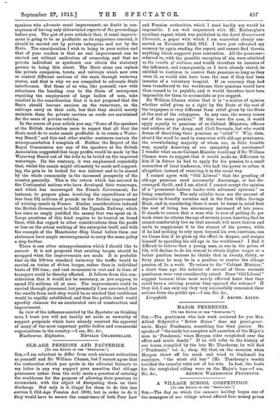OLD-AGE PENSIONS AND PAUPERISM.
[To THE ED/TOR OF THE "SPECTATOR."]
am reluctant to differ from such eminent authorities as yourself and Sir William Chance, but I cannot agree that the authorities which you quote in the editorial footnote to my letter in any way support your assertion that old-age pensioners (other than the sick) make a practice of entering the workhouse for the purpose of allowing their pensions to accumulate, with the object of dissipating them on their discharge. Not only is it illegal for them to do this (see ection 3, Old-Age Pension Act 1908), but in order to do it Alley would have to secure the connivance of both Poor Law and Pension authorities, which I need hardly say would be impossible. I am well acquainted with Mr. Rutherglen's excellent report, which was published in the Local Government Chronicle, a paper with which I am somewhat closely con- nected, on November 23rd, 1912. I have just refreshed my memory by again reading the report, and cannot find therein anything which supports your contention. All the pensioneri referred to, with the possible exception of six, were admitted as the results of sickness, and would therefore be inmates of the infirmary, and consequently, as I have already stated, be entitled to continue to receive their pensions so long as they were ill, as would also have been the case if they bad been inmates of a voluntary hospital. If on recovery they had been transferred to the workhouse their pensions would have then ceased to be payable, and it would therefore have been impossible for them to accumulate as you suggest.
Sir William Chance states that it is "a matter of opinion whether relief given as a right by the State at the cost of the taxpayers is very different from relief given by the State at the cost of the ratepayers. In any case, the money comes out of the same pockets." If this were the case, it would apply equally to pensions of ex-Cabinet Ministers, officers and soldiers of the Army, and Civil Servants, but who would dream of describing their pensions as "relief "? Why, then, should the word be used in connexion with old-age pensioners, the overwhelming majority of whom are, in their humble way, equally deserving of our sympathy and assistance ? I wonder what an ex-Cabinet Minister would say if Sir William Chance were to suggest that it would make no difference to him if in future he had to apply for his pension to a small committee of local tradesmen, who had the power to refuse it altogether, instead of receiving it in the usual way.
I cannot agree with "Old Liberal" that the granting of old-age pensions need necessarily discourage, or has dis- couraged, thrift, and I am afraid I cannot accept the opinion of a "prominent Labour leader with advanced opinions" as being conclusive. The only reliable tests are the amount of deposits in friendly societies and in the Post Office Savings Bank, and in considering these it must be borne in mind that the cost of living has enormously increased of late years. It stands to reason that a man who is sure of getting 5s. per week when he attains the age of seventy years, knowing that he cannot comfortably live on that amount, will move heaven and earth to supplement it to the utmost of his powers, while if he had nothing to rely upon beyond his own exertions, can we blame him if he gives up the effort in despair, and resigns himself to spending his old age in the workhouse ? I find it difficult to believe that a young man, or one in the prime of life, will decline to do his utmost to obtain higher wages or a better position because he thinks that in twenty, thirty, or forty years he may be in a position to receive the old-age pension of 5s. a week. To return to the "Cabinet Minister," a short time ago the salaries of several of these eminent gentlemen were very considerably raised. Does "Old Liberal" suggest because those most nearly affected knew that they could have a retiring pension they opposed the scheme ? If they did, I can only say they very successfully concealed their actions from the public eye.—I am, Sir, &c.,










































 Previous page
Previous page